Like the other able-bodied villagers in Fusing (復興) on the coast of Yilan’s Jhuangwei Township (壯圍), a 14-year-old Lin Jung-wen (林榮文) would drop whatever he was doing and run toward the ocean at the sound of the seashell horn.
A fishing boat had cast its 200m to 300m wide net, and about 20 villagers would pull on a rope attached to each end, slowly jerking and dragging the bounty — sometimes reaching 1 tonne — onto the shore. The boat owner claimed his share, and the rest would be split among everyone who helped, drawing lots to see who took home the larger piles.
On a Sunday morning last month, Lin, now 55, is among a group of mostly elderly men leading a large group pulling the net ashore. There’s even a man in his 70s, pulling on the rope with a belt-like device wrapped around his waist. But the remaining helpers are no longer villagers — they are visitors here to experience this long-lost traditional fishing practice of qiangu (牽罟).
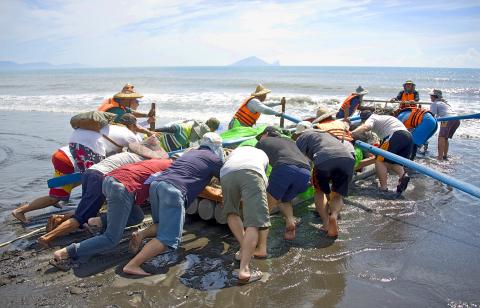
Photo: Han Cheung, Taipei Times
“We’re just trying to preserve our traditions,” Lin says. “There isn’t really that much fish to catch nowadays, and we just do it when visitors want to experience the old ways.”
Lin says qiangu, which used to happen several times a day, had mostly disappeared by the time he finished junior high school, mostly due to people preferring easier modern techniques and depletion of resources due to overfishing and ocean pollution. With little arable land in the area, most young people left the village to find work elsewhere, including Lin. He only moved his business back home about 10 years ago.
“Only people my age and up would have any knowledge of qiangu,” Lin says. “If you ask someone in their 30s and 40s, they wouldn’t know.”
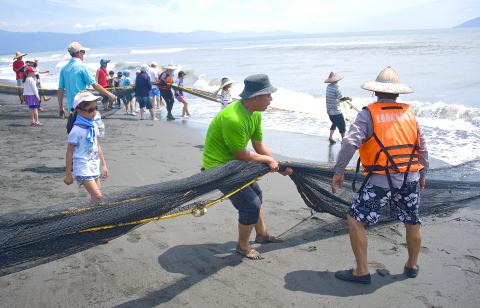
Photo: Han Cheung, Taipei Times
The village revived the practice in 2011 under the Houbi Community Development Association (後埤社區發展協會), which includes Fusing Village, and has implemented many programs to the area of mostly elderly residents. Initially, the village borrowed equipment from other localities and held qiangu about three times a year for tourists — but this year, they almost had to cancel the activities because they couldn’t find a lender. It would have cost about NT$400,000 to purchase their own.
In June, they received a broken boat and net for free from Gangbian Community (港邊) in nearby Suao Township. Association head Chang Yung-teh (張永德) says it was a fortuitous series of events, as Fusing village had originally made the net and sold it to Gangbian years ago.
“They had not had qiangu in a long time, and seeing that we were so enthusiastic about community building, they decided to give it to us,” Chang says. “In return, if they wanted to hold a qiangu, they would just come here and we would host it for them.”
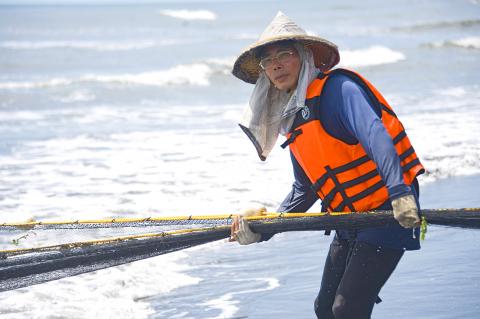
Photo: Han Cheung, Taipei Times
REVIVING THE ART
The beach at Fusing Village is a quiet one, devoid of tourists except for those who came to participate in Houbi’s various activities, including a photography camp. As the visitors enjoy themselves and take photos, Chen Hsin-cheng (陳信正), 74, sits silently among the revelry, focusing on his task of mending a qiangu net.
Chen is one of the elders that the association tracked down for his knowledge on qiangu, and he was also tasked with fixing the broken net the village received. Chen became a professional net mender when he was 14, and has never stopped. When qiangu went out of style, he went to the busier ports and mended nets for large commercial fishing boats. He also teaches net-mending to migrant laborers.
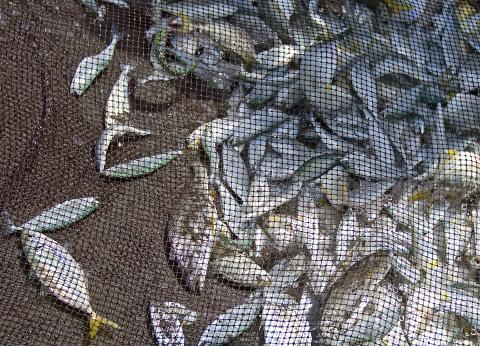
Photo: Han Cheung, Taipei Times
Chen is a matter-of-fact person. When asked how he felt that the village was reviving the practice, he replies, “It’s no different from what I did when I was young.”
But when the village hosted its first qiangu with its own equipment late last month, Chen was there, waiting to check on the nets after the haul and spending time fixing the net the day before the next group of tourists came.
Chang says it all started when he enrolled in a community development program in 2010 at Yilan Community College (宜蘭社區大學). He says the school would hold each year’s opening activities in different communities in Yilan with a focus on traditional activities. In 2011, they chose Houbi.
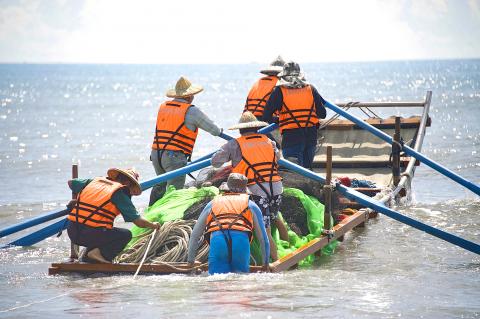
Photo: Han Cheung, Taipei Times
“The [school’s] principal wanted to stimulate activity in the community and prompt us to take a deeper look into our local culture,” Chang says. “We started researching our local resources, and remembered that we used to do qiangu here. Why has it disappeared?”
That day, more than 1,500 people participated. Chang says the elders remarked that they had never seen so many people on the beach before and that they were moved that young people still took an interest in the activity.
“We decided to continue doing it every year,” the 47-year-old Chang says. “As people of the ocean, we have the mission to pass on this tradition. Ocean culture is our roots. We cannot lose it during our generation; otherwise we cannot face our ancestors.”
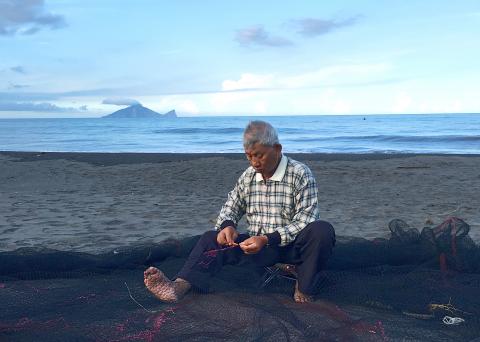
Photo courtesy of Sheryl Cheung
TRADITION AS TOURISM
When the net is finally hauled ashore, the tourists gather around to look at the hundreds of small fish, jellyfish and squid.
The haul is a far cry from the old days, but it’s still a full community affair as another group of villagers clean the fish and several women cook it in the community kitchen in one of the village’s restored old houses.
Afterward, the visitors, elders and staff of the various programs gather and share a meal from the bounty.
It’s a good beginning, Chang says, but there’s more work to be done. They hope to combine all the traditional resources such as peanut farming and peanut candy-making into a profitable tourism venture so that the younger generation would see some viability in returning home, where jobs are scarce.
And the elders are eager to pass on their knowledge — they just need to find people who are willing to learn.

Cheng Ching-hsiang (鄭青祥) turned a small triangle of concrete jammed between two old shops into a cool little bar called 9dimension. In front of the shop, a steampunk-like structure was welded by himself to serve as a booth where he prepares cocktails. “Yancheng used to be just old people,” he says, “but now young people are coming and creating the New Yancheng.” Around the corner, Yu Hsiu-jao (饒毓琇), opened Tiny Cafe. True to its name, it is the size of a cupboard and serves cold-brewed coffee. “Small shops are so special and have personality,” she says, “people come to Yancheng to find such treasures.” She

The low voter turnout for the referendum on Aug. 23 shows that many Taiwanese are apathetic about nuclear energy, but there are long-term energy stakes involved that the public needs to grasp Taiwan faces an energy trilemma: soaring AI-driven demand, pressure to cut carbon and reliance on fragile fuel imports. But the nuclear referendum on Aug. 23 showed how little this registered with voters, many of whom neither see the long game nor grasp the stakes. Volunteer referendum worker Vivian Chen (陳薇安) put it bluntly: “I’ve seen many people asking what they’re voting for when they arrive to vote. They cast their vote without even doing any research.” Imagine Taiwanese voters invited to a poker table. The bet looked simple — yes or no — yet most never showed. More than two-thirds of those

In July of 1995, a group of local DJs began posting an event flyer around Taipei. It was cheaply photocopied and nearly all in English, with a hand-drawn map on the back and, on the front, a big red hand print alongside one prominent line of text, “Finally… THE PARTY.” The map led to a remote floodplain in Taipei County (now New Taipei City) just across the Tamsui River from Taipei. The organizers got permission from no one. They just drove up in a blue Taiwanese pickup truck, set up a generator, two speakers, two turntables and a mixer. They

Former Chinese Nationalist Party (KMT) chairwoman Hung Hsiu-chu’s (洪秀柱) attendance at the Chinese Communist Party’s (CPP) “Chinese People’s War of Resistance Against Japanese Aggression and the World Anti-Fascist War” parade in Beijing is infuriating, embarrassing and insulting to nearly everyone in Taiwan, and Taiwan’s friends and allies. She is also ripping off bandages and pouring salt into old wounds. In the process she managed to tie both the KMT and the Democratic Progressive Party (DPP) into uncomfortable knots. The KMT continues to honor their heroic fighters, who defended China against the invading Japanese Empire, which inflicted unimaginable horrors on the